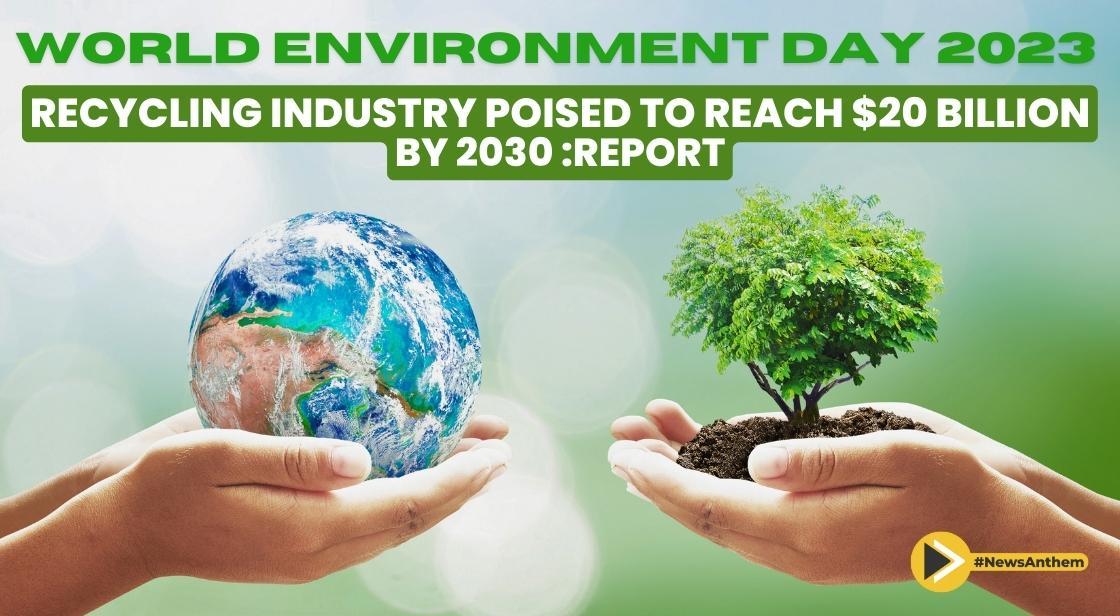World Environment Day 2023:"Recycling Industry Poised to Reach $20 Billion by 2030 : Report

News Synopsis
The Rise of the Circular Economy and its Benefits
The Avendus Capital report, to be unveiled on World Environment Day, underscores the immense potential of the recycling industry in India. By 2030, the combined market size of e-waste, plastic, and battery recycling is expected to reach $20 billion, according to the report.
The concept of a circular economy takes center stage, emphasizing a restorative and regenerative approach that contrasts with the linear consumption model prevalent today. Avendus Capital's analysis showcases the advantages of adopting a circular economy, not only for environmental sustainability but also for corporate growth, legislative support, and consumer engagement.
Plastic Recycling: Unleashing India's Potential
Despite the informal sector's significant role in plastic recycling in India, the report highlights that less than 10 percent of plastic currently gets recycled. However, with an anticipated compound annual growth rate (CAGR) of 24 percent, the plastic recycling industry could become a $10.2-billion market by 2030. Factors driving this growth include the increased use of recyclable plastics, their application in e-commerce and quick commerce packaging, and the adoption of lightweight product designs.
The report emphasizes the importance of initiatives like the Extended Producer Responsibility (EPR) policy in streamlining collection and segregation processes. Additionally, leveraging advanced technologies such as artificial intelligence (AI) holds promise for enhancing plastic waste recycling and repurposing efforts.
Electronic Waste: From Obsolescence to Urban Mining
The report draws attention to the shrinking shelf-life of electronic devices, resulting in a higher generation of electronic waste (e-waste). Globally, only 18 percent of e-waste is currently repurposed. However, the report suggests that with proper infrastructure and permissions, urban mining ventures can extract valuable metals from electronic waste.
Gold, silver, and copper, expected to be exhausted within the next few decades, can be sourced from discarded electronic devices. This shift towards urban mining is projected to fuel a 23 percent CAGR, leading to a $7.5-billion e-waste recycling industry by FY30.
Battery Recycling: Nurturing a Sustainable Electric Vehicle Industry
With the rising demand for electric vehicles (EVs) and energy storage, batteries play a pivotal role. However, the report highlights social justice concerns within the battery-manufacturing industry, particularly in cobalt mining regions like the Democratic Republic of the Congo. To address these issues and ensure a steady supply chain, recycling batteries becomes a crucial and efficient method of sourcing metals such as cobalt, nickel, and lithium.
Given the scarcity of these metals and the complexity of their extraction, battery recycling presents a sustainable solution. As economies strive to reduce reliance on fossil fuels and achieve environmental targets, the battery recycling industry is projected to grow at a 23 percent CAGR, reaching a value of $7.5 billion by FY30.
By recognizing the potential of recycling and embracing a circular economy, India can pave the way towards a sustainable and resource-efficient future. The Avendus Capital report serves as a timely reminder of the urgent need to address waste management, environmental conservation, and social responsibility.
To capitalize on the projected growth of the recycling industry, policymakers, businesses, and communities must work hand in hand to create an enabling environment. Here are some key steps that can be taken:
-
Strengthening Infrastructure: Investing in robust waste management infrastructure is crucial to facilitate efficient collection, segregation, and recycling processes. This includes establishing recycling centers, waste treatment plants, and effective logistics systems to ensure seamless operations.
-
Legislative Support: The government plays a pivotal role in driving sustainable practices through policies and regulations. Implementing and enforcing Extended Producer Responsibility (EPR) policies, incentivizing recycling initiatives, and promoting eco-friendly packaging can significantly boost the recycling industry's growth.
-
Public Awareness and Education: Raising awareness among the public about the importance of recycling and the benefits of a circular economy is essential. Educational campaigns, workshops, and community engagement programs can help foster a culture of responsible consumption and waste management.
-
Technology Adoption: Embracing advanced technologies like artificial intelligence, data analytics, and automation can revolutionize recycling processes. These innovations can streamline operations, enhance material recovery rates, and improve the overall efficiency and effectiveness of recycling initiatives.
-
Collaboration and Partnerships: Collaboration between different stakeholders, including businesses, non-governmental organizations, academia, and local communities, is crucial. By joining forces, sharing knowledge and resources, and fostering partnerships, a comprehensive and sustainable approach to recycling can be achieved.
As India progresses towards a circular economy, it not only addresses the pressing environmental challenges but also unlocks significant economic opportunities. The recycling industry's growth will create jobs, promote sustainable business practices, and reduce dependence on virgin resources.
On World Environment Day, let us reflect on the importance of recycling and commit ourselves to preserving the planet for future generations. By embracing the principles of a circular economy and harnessing the potential of the recycling industry, we can build a greener, cleaner, and more sustainable world.
You May Like









